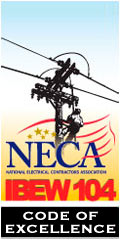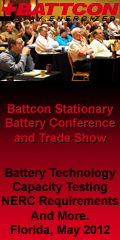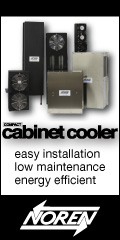NEPPA eNewsletter
June 2012
|
Jay Anderson is the new general manager of the Marblehead Municipal Light Department. Anderson started as technical operations manager/engineer and has been with the utility for four years. Previously, he worked for National Grid for 18 years. He has a B.S.E.E. from the University of Massachusetts at Lowell and he is a life-long resident of Lynn, Mass. He is a third-generation electric company worker. Anderson replaces Bob Jolly, who retired earlier this year, and he is finding the transition to GM manageable because he knows the projects and the direction in which the utility is planning to go. "Bob did a lot of rebuilding of substation and distribution lines around town," said Anderson. "Four out of five substations have been rebuilt and the fifth is in the conceptual stage. So the major systems are in good shape." Major projects he is facing include the total rehab of the building, a new computer network and a new radio system. Anderson is a big proponent of public power. "Keeping it local and investing in the community is what it is all about," said Anderson. "You can see the difference during storm scenarios. The municipals are way ahead of the game in reliability." ##SHARELINKS##
|
|
I am writing this month’s article over the Memorial Day weekend after visiting our New York classes and the New York associations that represent public power. There are many differences between our region and New York, yet there is even more synergy and commonality. As someone who grew up in Syracuse, N.Y., I can tell you that "up-staters" pride themselves on the ability to overcome adversity as much as New Englanders pride themselves on their independence. Growing up, we used to complain about the Alka Selzer ads touting Buffalo as having the toughest winter conditions. They got far less snow and nowhere near our level of cold. This is probably what drove me to supporting the Boston teams. So, traveling to western New York and then along the eastern border I was pleased to see how strong and well prepared the public utilities were. However, even with all of their preparedness there are issues that could be assisted by collaboration with NEPPA. It takes six hours for mutual assistance to arrive in Long Island from upstate New York because of the distance. I imagine it would probably take around two hours from our southern Connecticut members. This rationale was not wasted on the MEUA and NYAPP members. On Thursday, May 24, Scott Edwards (NEPPA's Mutual Aid Chair) presented to the NYAPP members and reviewed our Mutual Aid agreement and program. There were several questions, as well as recognition for the excellent performance of all of our participating members. Also, while at the NYAPP meetings a New York state official asked the NYAPP members to develop or investigate a program to help returning vets. This made me recollect a recent discussion I had with Dave Schofield from Peabody (Mass.) Municipal Light Department. As an Army Corps of Engineers Reservist he had discussed with me the great work his unit did in Iraq rebuilding the electrical infrastructure. These two compatible needs require just one resource to create the synergy to fulfill them: NEPPA. With our training resources and knowledge we have the capability to help our returning vets and the utilities in New England and New York in search of qualified crew candidates. I can’t imagine a better-fitting initiative for us to explore as I return to my Memorial Day weekend. One final note on Mutual Aid: current President John Bilda’s testimony at the Senate’s Energy Committee demonstrated and acknowledged the extremely impressive job that our members did this past year with the two major events. Good job and thanks to all of the folks who work so hard to make our mutual aid program so successful! ##SHARELINKS##
|
|
Belmont Municipal Light Department staff (standing from left to right): 1st Class ##SHARELINKS##
|
|
NEPPA has scheduled a General Foremen Round Table for Aug. 8, 2012 at the new NEPPA training facility in Littleton, Mass. The event will open with a tour of the new facility and will include an interactive safety summit covering the following topics: recent accidents, rubber glove testing and poletop/bucket rescue classes. This will be followed by a Q & A and open topics from participants. A video on workplace violence will be viewed, followed by discussion. Lunch will be included. The GF round table provides an opportunity for GFs to network with their counterparts in other utilities, get answers to questions and gain knowledge. The sessions are interactive and participation from attendees is strongly encouraged. Watch your mail for details.
##SHARELINKS##
|
|
June 6 Customer Service Conference 2012 Gillette Stadium, Foxboro, Mass. Don't miss out on this fantastic venue with quality speakers and a tour of the stadium. This isn't just for CS reps. It’s a team game, so bring the whole team! June 15 June 20-21 Aug. 8 Sept. 16-19 ##SHARELINKS##
|
|
This is a question that I have been asking of line crews during a few of my recent safety meetings. "I AM!" is always the emphatic answer I get. Indeed, we are all responsible for our own safety. In light of the most recent fatal accidents here in New England and in light of a few accidents that have resulted in serious injury, I follow that question with this – "If we are ultimately responsible for our own safety, why aren’t we doing a better job?" Usually the room falls silent.
It seems as I travel around New England that many electric utilities are doing a fair job of working safely. Most utilities have a safety manual of one sort or another. Some utilities use the APPA Safety Manual which sets forth the minimum safety standards for many electric utilities in the country. Some utilities have modified their APPA Safety Manual with errata sheets to more specifically address situations of particular interest or concern to their utility. Few utilities however require that the employees read and comprehend their safety manual. Many electrical workers are uninformed when it comes to the "rules". Rules that are known are often "bent" in the interest of making a job easier, faster or more convenient. Shortcuts are often taken. Too often safety meetings are not taken as a seriously as they should be. The results of such behaviors can be costly. We may be doing a fair job, but why aren’t we doing the BEST job? If we are to do the "BEST" job, we must first make sure we know what the safety manual says by studying it and we must follow the rules to the best of our ability. We must recognize that any safety manual is only the minimum safety requirement and actual work situations may require even more than the minimum. We must become more diligent in our work procedures and always use safe work practices no matter how much longer it takes to do the job safely. We need to keep a constant vigil on our attitude towards safety to always keep it in the proper place. And we need to not only be responsible for our own safety but also take responsibility for the safety of others around us. It may be easier to "look the other way" today but doing so could be very difficult to deal with tomorrow. There is always room for improvement even in the best of us. ##SHARELINKS##
|
|
In a May 11 letter to Federal Energy Regulatory Commission (FERC) Chairman Jon Wellinghoff, Rep. Ed Markey (D-MA), a senior member on the House Energy and Commerce Committee and ranking member on the Natural Resources Committee, voiced concern that the Commission’s transmission rate incentives are excessive. "While investments in new transmission facilities can be a part of [a] modernization effort, I am concerned that the Commission’s policies regarding transmission investment...have resulted in consumers paying excessive charges," Markey said. He hopes FERC will "implement needed reforms" after considering all comments filed in an ongoing FERC proceeding. NEPPA and its members have consistently raised concerns about the impact on customers of the increasing transmission costs in New England and the need for FERC to be more judicious when approving transmission rate "adders." NEPPA Massachusetts members specifically asked Markey to weigh in with the Commission when they met with his office during the APPA Legislative Rally. Markey said he also strongly supports FERC’s recent order setting a hearing for the New England transmission base return on equity (ROE) complaint led by the Massachusetts Attorney General (AG). "The boom in transmission construction in New England since 2003 has led to a 500% increase in transmission costs for consumers and pushed the region’s transmission rates to some of the highest in the country," Markey said. "As a percentage of total power costs, transmission costs will increase from less than 6% in 2008 to approximately 21% in 2014." Markey said that while transmission investments may be necessary, in the last few years there has been a "prolific use of return-on-equity ‘adders’ for new transmission that, in some cases, have given transmission owners risk-free, formula-based returns of up to 13.5% on new projects." He said that, given current economic growth and interest rates, "such [ROE] for predictable infrastructure investments seem even more inflated." With large, well-capitalized companies increasingly dominating the regional market for new transmission, "excessive and unwarranted incentive transmission rates are disproportionately benefitting the bottom lines of transmission builders at the expense of electricity consumers," Markey said. He called on FERC to establish a regulatory framework that will ensure incentive rates "are not simply an added cost borne by consumers on an investment that would have been made in any event." Along with addressing incentive policies, the best way to address rising transmission costs in New England would be for FERC to reduce the base ROE for the region’s transmission owners from the current level of 11.1% to 9.2%, as requested by the Massachusetts AG and others. Reducing the base ROE, Markey said, could save New England ratepayers $100-$200 million per year. To read the complete legislative update including the following topics, click here.
Senate Confirms Norris, Clark to FERC House Takes Action on Cyber Legislation; GRID Act Put on Hold 2011 Outage Report Calls for Improved Planning Report Warns of Shortfall in Funding for Grid Upkeep FERC Audits NERC’s Performance Senate Hearing on Bingaman’s Clean Energy Standard Macfarlane Nominated to the NRC to Replace Jaczko ##SHARELINKS##
|
Problem Solving: Managers Must do More
|





